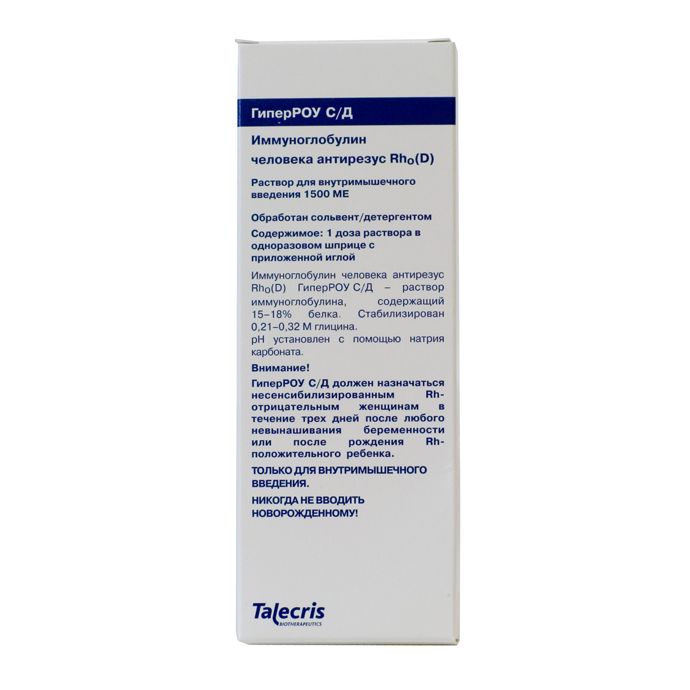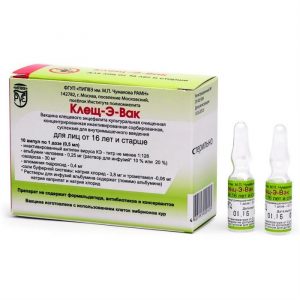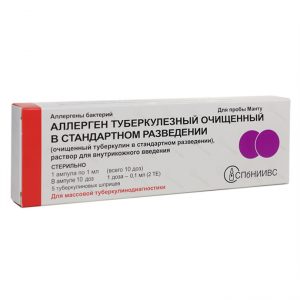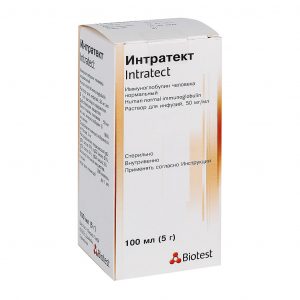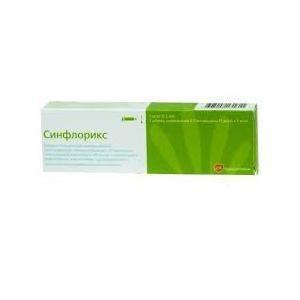Description
Latin name
HyperRHO S / D
Release form
Solution for intravenous injection rrd4848 for i / m administration, it is transparent or slightly opalescent, colorless or slightly yellow in color, without foreign inclusions during storage, the appearance of a slight precipitate disappears when the drug is shaken at a temperature of 20 ± 2 ° C.
Packaging
1 dose (1500 IU) – disposable syringes with a needle (1) – packs of cardboard.
Pharmacological action
Immunological preparation. It is an immunologically active protein fraction isolated from human plasma or serum of donors tested for the absence of antibodies to human immunodeficiency virus (HIV-1, HIV-2), hepatitis C virus and hepatitis B surface antigen B.
The active component of the drug is immunoglobulin G containing incomplete anti-Rh0 (D) antibodies.
Prevents iso-immunization in a Rh-negative body of a woman exposed to Rh-positive blood as a result of fetal blood entering the mother s bloodstream during the birth of a Rh-positive baby, during abortion (as spontaneous, and artificial), in the case of an amniocentesis or in case of injury to the abdominal organs during pregnancy.
When a human immunoglobulin is administered, the Rh0 (D) anti-Rhesus virus within 72 hours after giving birth to a fully-born Rh0 (D) -positive baby with an Rh0 (D) -negative mother decreases the frequency of Rh isoimmunization.
Indications
The drug is indicated for use in Rh-negative women not sensitized to the Rh0 (D) antigen (i.e., in the absence of Rh antibodies), provided:
of pregnancy and the birth of a Rh-positive baby
with artificial and spontaneous abortion
when an ectopic pregnancy is terminated
with the threat of termination of pregnancy for any period of
after amniocentesis and other procedures associated with the risk of fetal blood entering the mother ² ¢s bloodstream, as well as in case of injury abdominal cavity.
Contraindications
Rh-positive puerperas
Rh-negative puerperas sensitized to the Rh0 (D) antigen (in the blood serum of which Rh antibodies were detected).
hypersensitivity to the drug.
It is forbidden to administer the drug to newborns.
Special instructions
In children born to women who received the human immunoglobulin Rh0 (D) antiresus before birth, mildly positive direct test results for the presence of antiglobulin may be obtained at birth. In the blood serum of the mother, it is possible to detect antibodies to Rh0 (D) obtained by the passive route, if antibody screening tests are performed after prenatal or postnatal administration of a human immunoglobulin to Rh0 (D).
Immunization of women with live vaccines should be carried out no earlier than 3 months after drug administration.
Due to the possibility of developing allergic reactions, patients should be monitored for 30 minutes after administration of the drug. In the room where the drug is administered, there should be anti-shock therapy. With the development of anaphylactic reactions, antihistamines, GCS and alpha-adrenergic agonists are used.
Therapy with HyperROU C / D may be combined with other drugs, in particular with antibiotics.
Composition
Active ingredient:
immunoglobulin G1500 IU
Excipients:
glycine,
water for injection.
Dosage and administration of
The drug is administered i / m at 1 dose (1500 IU) or 2 doses (3000 IU) once: to the puerpera – within 72 hours after delivery, when the pregnancy is terminated – immediately after the operation.
The following criteria must be met:
the mother should be Rh negative and should not already be sensitized to the factor Rh0 (D)
her baby should be Rh positive.
If the drug is administered before birth, it is important that the mother receives another 1 dose of the drug after the birth of a Rh-positive baby within 72 hours after delivery. If the father is found to be Rh negative, there is no need to administer the drug.
Before administration, syringes with the preparation are kept for 2 hours at room temperature (20 ± 2 ° C). In order to avoid the formation of foam, the drug is drawn into a syringe with a needle with a wide clearance.
The drug can not be entered in / in!
For prophylaxis in the postpartum period, 1 dose (1500 IU) of HyperROU C / D should be administered during the first 72 hours after delivery. The need for a certain dose in the case of the passage of the full gestation period varies depending on the amount of fetal blood that has entered the mother s bloodstream. 1 dose (1500 IU) contains a sufficient amount of antibodies to prevent sensitization to the Rh factor if the volume of fetal red blood cells that enter the bloodstream does not exceed 15 ml.
In those cases when it is expected that a larger volume of fetal red blood cells (over 30 ml of whole blood or more than 15 ml of red blood cells) enters the mother s bloodstream, the fetal red blood cells should be counted using an approved laboratory method (for example, the Kleichauer and Betka modified acid wash-stain method) to establish the necessary dose of the drug.
The calculated volume of fetal red blood cells that enter the bloodstream of the mother is divided into 15 ml and the number of doses of HyperROU C / D that must be administered is obtained. If it is assumed that more than 15 ml of fetal red blood cells are present or if fractions are obtained as a result of dose calculations, the number of doses should be rounded up to the next whole number in the direction of increasing, for example, when receiving a result of 1.4, 2 doses (3000 IU) of the drug should be administered.
For prophylaxis in the prenatal period, 1 dose of the drug (1500 IU) should be administered at approximately the 28th week of pregnancy. For this, it is absolutely necessary to introduce another 1 dose (1500 IU), preferably within 72 hours after delivery, if the baby is Rh-positive.
In the case of continued pregnancy after the threat of abortion occurs at any stage of pregnancy, 1 dose (1500 IU) of the drug should be administered. If it is suspected that more than 15 ml of fetal red blood cells enter the mother s bloodstream, it is necessary to change the dose (as indicated above).
After a spontaneous abortion, artificial abortion, or abortion with a gestational age of more than 13 weeks, 1 dose (1500 IU) of the drug is recommended. If it is suspected that more than 15 ml of fetal red blood cells enter the mother s bloodstream, it is necessary to change the dose (as indicated above). If the pregnancy is terminated for less than 13 weeks, a single dose of a mini-dose of HyperROU C / D (approximately 250 IU) is possible.
After an amniocentesis at the 15-18th week of pregnancy, or during the III trimester of pregnancy, or when an abdominal organ injury occurs during the II and / or III trimester of pregnancy, 1 dose (1500 IU) of the drug should be administered. If it is suspected that more than 15 ml of red blood cells enter the bloodstream of the mother, it is necessary to change the dose as described above. If an abdominal injury, amniocentesis, or other adverse circumstance requires the administration of the drug for a period of 13-18 weeks of pregnancy, another 1 dose (1500 IU) should be administered for a period of 26-28 weeks.
To maintain protection throughout pregnancy, the concentration of passively obtained antibodies to Rh0 (D) should not be allowed to fall below the level necessary to prevent an immune response to Rh-positive red blood cells. T1 / 2 of the human immunoglobulin antirhesus Rh0 (D) is 23-26 days.
In any case, the dose should be administered within 72 hours after birth if the baby is Rh-positive. If childbirth occurs within 3 weeks after receiving the last dose, the postpartum dose can be canceled (except in cases where more than 15 ml of fetal red blood cells have entered the bloodstream of the mother).
Drug Interactions
Drug Interactions HyperROU C / D are not described.
Overdose
There are no known cases of overdose with HyperROU C / D.
Storage conditions
The product should be stored in a dark place away from children at 2 ° to 8 ° C and must not be frozen.
Not suitable for use in a syringe with compromised integrity or marking, with changes in physical properties (discoloration, cloudiness of the solution, the presence of non-destructible flakes), with expired life, with improper storage.
Transport is carried out by any type of covered transport at a temperature of 2 ° to 8 ° C.
Shelf life
3 years.
Deystvuyushtee substance
Immunoglobulin per person antirezus Rho (D)
Terms and conditions
prescription
Dosage form
injection for injection
Possible product names
HYPERROW IMMUNOGLOBULIN ANTIRESUS 1,5TH. ME SYRINGE
HyperRow S / D solution for i / m 1500ME 1dz spr 1ml / N1
Hyperrow S / D syringe dose, 1500 ME
Grifolz Terapeutiks Inc., USA
